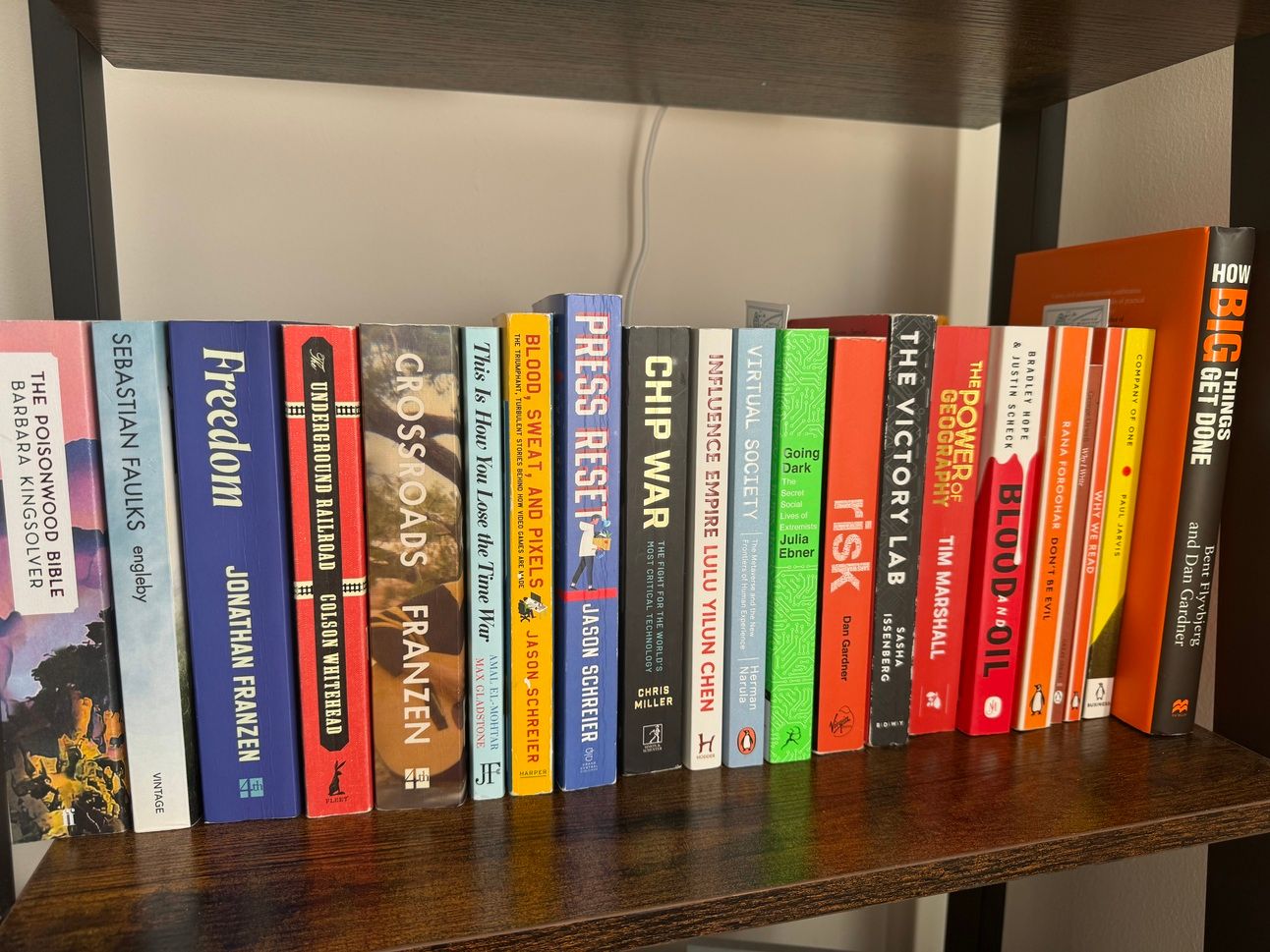
George E. Osborn’s Shelfie
I’ve got a good few bookshelves in my flat but this shelf is the one I chose to photograph because it expresses better than anything else an oddly personal journey I’ve been on in the past couple of years.
Between the back end of 2022 and now, I quit a job that felt central to my identity but I was tired of doing. I took on another role that I thought would be the next step in my career but ended up, through no-one’s fault but my own, being a confident stride in the wrong direction. I then founded my own business, set up a newsletter and took a punt on pitching a book that, somehow, has kinda worked out for me so far.
This might seem like a strange non-sequitur but there’s a point to it. This bookcase, and this shelf, exists because I needed somewhere new to begin stacking up everything I had picked up during this transition period: leading to the emergence of what looks like a disordered hodge-podge of non-fiction and fiction.
But that does a disservice to what the shelf represents. Its thematic untidiness is not typical of how I would normally order my books (hand up who loves some alphabetising raises hands). It is, though, representative of the undulating personal journey that’s led me to the point of writing this.
The starting point of that journey is The Poisonwood Bible by Barbara Kingsolver. It was given to me on my birthday in early March 2023 by a then girlfriend who told me it was her favourite book and wanted to share it with me because of its significance to her.
By the end of that month, and before I had finished reading it, she had broken up to me. Finishing it was heartbreaking, especially because I could see how many of the book’s major themes seemed to dovetail with the challenges of her life.
But it also played a role in prompting me to think much more closely about what I stand for and where I was going - something that, eventually, led to me taking a deep breath to set up my own business.
The next step in this story can be found on the other side of the shelf in the form of Paul Jarvis’s Company of One.
Setting up and running your own business is an exhilaratingly stupid thing to do. Until you’ve experienced it yourself, it is hard to truly understand how business owners are simultaneously utterly deluded optimists and the most fatalistic of pragmatists.
The reason Paul’s book resonated with me is that it guided me towards a middle ground as a solo founder. Yes, you do need to be disciplined, keep your costs low and know how to sell. But if you’re happy to eschew double digit growth in favour of benchmarking what you do against what you need to succeed, you can make your own business genuinely work for you.
And even though I’ve not quite got that mix right just yet, it’s a book that I return to when I need to remind myself thatI set a company up to serve me - not the other way round.
When it comes to serving others, especially a lay audience, Chip War: The Fight for the World’s Most Critical Technology by Chris Miller is the book that inspired my approach to the way I explain video games to the different audiences I work with.
Chip War’s genius is the way it bolts a topic that could be ponderously inaccessible in the wrong hands - the strategic significance of semiconductors - to a readably urgent, but non-hyperbolic, narrative.
As someone who spends a lot of his time having to convince people that, yes, video games are quite a big deal actually, Chip War is the essential reminder that the best way to do that is by winning an argument with evidence, craft and compelling story-telling.
My business, my newsletter and my book would look very different if I hadn’t read it last Summer - making it one of the most significant reads of my life.
Finally, to round off the story of my year, Julia Ebner’s Going Dark: The Secret Social Lives Of Extremists is the book that represents where my work has developed into 2024 versus 2023.
Last Autumn, I made a leap based on a hunch that there is a real desire from the wider world to understand the ways that video games are influencing our day-to-day lives.
By the time I picked up Julia’s book about the places where extremists congregate in online spaces in late May 2024, I had been introduced to the way the far-rght had sought to exploit games communities and met law enforcement officials wrangling with the challenges it presented them at an event in Barcelona.
Reading Julia’s book - which is frankly essential if you want to understand the dark direction much of Western political culture has gone - deepened my conviction both that video games are having a remarkable downstream impact on our lives and that there is, at least something, in my efforts to try to pull together those threads through the work I’m doing.
Of course, there are other stories to be found on this shelfie:
Jonathan Franzen’s presence on the shelf is a late in the day acknowledgement by me that his work tackles topics that are remarkably close to my family life.
The run of books between Jason Schreier’s Blood, Sweat and Pixels to Rana Foroohar’s Don’t Be Evil is a taste of the remarkably wide reading I’m having to do to keep on top of all things video games.
And the presence of two books called Why We Read and Why I Write may ever so slightly reflect my neurotic fears about whether I can actually put down words in a form to compel an audience.
But the books I’ve picked out on my shelf are indicative of the factors that guided an important shift in my personal and professional life that has left me, for the first time in a long time, feeling remarkably content with where my life is heading.
And while the shelf might be messier than I’d ideally like it to be, that is, just sometimes, the only way that we can find a way forward in life that we’re happy with.

George Osborn (not a shelfie)
George E. Osborn is a consultant and writer working in the video games industry. He’s the creator of Video Games Industry Memo, a weekly newsletter that aims to explain games to the big wide world. George is writing his debut non-fiction book Power Play: The Inside Story of How Video Games Influence The World (Spring 2026). He’s also popped up as an industry expert via his business Half-Space Consulting in places like The New York Times, BBC News and Politico.
Shelfies is edited by Lavie Tidhar and Jared Shurin. If you are interested in sharing a shelfie, please let us know.